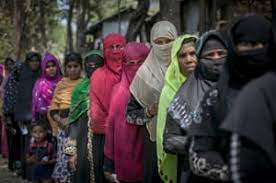The Causes Of The Exodus Of Muslims From Myanmar Known As The Rohingya Crisis And How Are They Persecuted?
The Rohingya group in Myanmar has emerged as the public face of stateless migrants fleeing persecution in their own country in recent years.
Since they are not considered citizens, official data are lacking, but estimates place the number of Rohingyas in Myanmar at over a million, with an additional million perhaps living abroad as migrants and refugees. In the city of Cox Bazaar, Bangladesh alone, nearly 900,000 refugees are housed in 33 camps that have grown over time.
Decades of rebellion led by members of the community and governmental persecution of the Rohingya people are the main causes of the problem. Over the last ten years, thousands of Rohingyas have left the nation due to increasing legal restrictions placed on them and violent crackdowns by the Myanmar military, which has been accused of murdering civilians, raping women, and demolishing whole villages.
Regarding the Rohingya insurgency, there is still an ethnic struggle between the Rohingya minority and the majority Buddhist population of the nation, despite the fact that some have perceived it as an Islamist movement due to the fact that the leaders and members of the group are mostly Muslims and have utilized Arabic in their marketing materials.
Here, we describe the Rohingya population, the reasons for their migration from Myanmar, and the methods used by the country’s government to oppress them.
The Rohingyas are who?
The majority of Myanmar’s ethnic minority, the Rohingyas, identify as Muslims. The majority of them reside in the state of Rakhine, formerly known as Arakan.
The government of Myanmar denies the Rohingyas’ claim to be a unique ethnic group and instead views them as Bengalis. Their citizenship has been refused, and it can only be granted if they declare themselves to be Bengalis.
The Rohingya people lack the rights and freedoms accorded to citizens since they are not regarded as citizens. Despite the temporary restoration of electoral democracy to Myanmar in 2015, more than a million Rohingyas were denied the right to vote.
The confrontation between Buddhists and Rohingya in Myanmar is not new. It dates back to the time when post-colonial Myanmar (previously known as Burma) was founded. According to a backgrounder published by the think tank Center for Strategic and International Studies (CSIS), Muslims in Rakhine rebelled for equal rights shortly after Myanmar declared independence in 1948. The insurgency was put down by 1954, and a ceasefire was established. However, over time, the majority’s attitude toward the Rohingyas became more hostile.
“The government’s attitude toward religious and ethnic minorities was toughened by the military takeover of Myanmar in 1962; the Rohingya Muslims in Rakhine State in particular were once again subjected to persecution. The CSIS backgrounder states, “The Rohingya were denied citizenship in 1982 and classified as ‘non-nationals’.”
Parts of the Rohingya people revived the rebellion in the 1970s. With assistance from Saudi emigrants and funders, the Arakan Rohingya Salvation Army (ARSA), commanded by its leader Attullah Abu Amar Jununi, was established in 2013 and is now leading the insurgency from Saudi Arabia.
According to the Associated Press, ARSA was founded as a result of decades of institutionalized discrimination, which included not recognizing them as citizens and denying them fundamental rights. It also mentioned instances of majoritarian violence against the community.
The circumstances that gave rise to the group’s formation are attributed by analysts to Myanmar’s government. The majority of the Rohingya have lived in Myanmar, also known as Burma, for decades, but have been denied fundamental rights and citizenship by successive administrations in the mostly Buddhist nation, who see them as alien invaders from Bangladesh.According to AP, “the seeds for armed rebellion were sown by the lack of a political solution to their plight, especially after anti-Muslim violence in 2012 forced more than 120,000 Rohingya from their homes.”
In what ways has the Rohingya problem become worse recently?
Although the Rohingya minority has been subjected to majoritarian persecution for decades, things worsened in 2012. Tens of thousands of Rohingyas fled to neighboring Bangladesh, Malaysia, Thailand, and Indonesia as a result of a series of riots between Rohingyas and Buddhists that claimed numerous lives. There were also over 200,000 internal displacements inside the Rohingya-majority state of Rakhine.
Large-scale assaults by Rohingya insurgents in 2017 claimed the lives of scores of people, including many members of the security services. Following the attacks, the military of Myanmar launched a vicious response that included raids on communities, the purported destruction of whole villages, and the sexual abuse of women.
At least 6,700 Rohingyas, including at least 730 children under the age of five, are said to have died in the month after the start of the violence, according to the medical organization MSF. Separately, Human Rights Watch (HRW) said that 288 villages in Rakhine were completely or partly destroyed by flames during the outbreak of unrest, citing analysis of satellite images.
Following the violence in 2017, the United Nations High Commissioner for Refugees (UNHCR) reports that over 742,000 Rohingyas took refuge in Bangladesh. There are an estimated 900,000 Rohingyas in Bangladesh now, the most of whom reside in the 33 refugee communities in Cox Bazaar. From 2021, when a military coup in Myanmar ousted the civilian government, a civil war broke out, the bloodshed and internal displacement have not ceased.
“Armed clashes across Myanmar have continued to trigger displacement, bringing the total number of internally displaced people (IDP) within the country to more than 1.8 million — including 1.5 million of whom have been internally displaced since February 2021,” according to the UNHCR.
In what ways are Rohingyas disadvantaged in Myanmar?
The Rohingyas face persecution in a variety of ways, apart from the apparent problems of systematic brutality, denial of citizenship, and violation of fundamental rights.
The following is a list of institutionalized forms of harassment against Rohingyas provided by the think tank Council on Foreign Relations (CFR):
In many regions, couples from Rohingya are only permitted to have two children.
Rohingyas also need permission before getting married.
In violation of Muslim norms, Rohingyas are required to give images of the groom and bride without a headscarf and without facial hair for the purpose of marriage.
When moving to a new residence or leaving their township, Rohingyas need permission from the government.
Armed groups and radicalization exacerbate the situation
Although there is still widespread agreement that the Rohingyas are severely persecuted in Myanmar, to the point where one million of them have been forced to flee in several waves over the past few decades in fear for their lives, the countries that host populations of refugees have also had to deal with radicalization within the camps. For host nations like Bangladesh, this has made matters more difficult.
Over the years, opposing parties have assassinated many Rohingya leaders in violent episodes inside the Rohingya community. Drug problems have further increased the vulnerability of refugee communities due to a lack of employment options and the presence of criminal groups. An official in Bangladesh told PTI in 2022 that drug smuggling from Myanmar poses a danger to the whole region and that in the preceding six months alone, officials had confiscated 14.8 kg of gold and 1,55,65,244 pieces of the illegal substance “Yaba” from Rohingyas.
“Rival terrorist groups, including as ARSA, are engaged in conflict over the lucrative but illicit narcotics and armaments trade at Bangladeshi and Myanmar borders as well as inside the camps housing refugees. According to Animesh Roul, in a piece for the think tank Jamestown Foundation, “ARSA’s cross-border movement and penetration into the Bangladeshi hinterlands will exacerbate Bangladesh’s struggle to contain the instability on its southeastern frontier if the situation worsens.”
In addition, while Rohingyas have been the target of decades-long persecution and massacres, militant Rohingya organizations have also been accused of murdering minority Hindus in Myanmar. According to Amnesty International, the Arakan Rohingya Salvation Army (ARSA) kidnapped Hindu villagers in August 2017 and slaughtered up to 99 Hindu men, women, and children.







